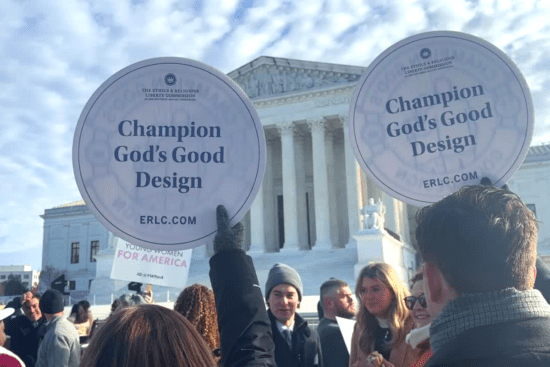A Series on Pursuing Good: Discerning Well-Crafted Policy
An election year can quickly become about candidates. But, we often forget that those candidates and the people who will serve under their administration will run on a platform of policies that affect real people—our kids’ teachers, the clerk at the grocery store, our friends in healthcare, and our aging parents. Avoiding partisan talking points and seriously thinking about these policies from a biblical perspective is paramount to our call to be salt and light. This series of articles will assist you in what to look for and consider as you weigh policies dealing with life, religious liberty, marriage and family, human dignity, and foreign affairs. Together, we can use our voices and our votes to pursue the good of our nation.
Life policy
Marriage and family policy
Human dignity policy
Foreign affairs policy
Separation of church and state doesn’t exclude Christian principles from politics
“Church and state should be separate.” Those aren’t the words of Thomas Jefferson or of a modern irreligious progressive. Those are the words of the Baptist Faith and Message 2000 (BFM2000).
At the Core of Baptist Identity
That church and state should be separate isn’t to suggest that Christian morality has no role to play in shaping public policy.
Matthew T. Martens
Every public policy reflects someone’s morality, and Christian ethics should not be excluded from debates in the public square. As the BFM2000 puts it, “Christian[s] should seek to bring … government … under the sway of the principles of righteousness.”
What is precluded by Baptist principles, however, is the state “impos[ing] penalities for religious opinions of any kind.” Rather, “all men” have “the right to form and propagate opinions in the sphere of religion without interference from civil power” and “no ecclesiastical group or denomination should be favored by the state more than others.” These principles are every bit as much at the core of Southern Baptist identity as is believer’s baptism.
The commitment to religious liberty has a long pedigree in Baptist thought. John Leland, a Baptist minister in early America, argued that “religious matters are to be separated from the jurisdiction of the state … because they are too high and holy and thus beyond the competence of the state.”
Or to put it more plainly, if you think doctrinal orthodoxy is hard to maintain among even a group of committed and likeminded Baptists, imagine the difficulty of maintaining orthodoxy if that obligation is assigned to a body politic comprised of disparate Christian commitments, not to mention non-Christians.
Today’s Temptations
The temptation to assign religious matters to the jurisdiction of the state presents itself in different ways. Some, today, advocate for a form of Christian nationalism that by law would preference Christianity in the culture. As noted above, legislation and other state action require that ethical judgments be made by government officials, and it is entirely appropriate for those officials to take Christian ethics into account in shaping public policy.
But this is very different from using the coercive power of the state to favor Christians and disfavor other religious practitioners as such. Some today are falling prey to this temptation, however, arguing that, contrary to the BFM2000, civil power should be used to bar non-Christian religions from constructing places of worship.
A similar threat to religious liberty is being posed by the increasing willingness of Baptists to take one another to civil courts to resolve what are fundamentally ministry disputes. Not only is this rebellion against clear biblical teaching (1 Cor. 6:6), but it also invites the state into a realm in which it lacks competence and jurisdiction. Given our long history of insisting on church-state separation, Baptists should not be inviting state judges to intrude into disputes over the governance of religious organizations and entities.
As we think about good policy related to religious liberty, we should be careful to remember these principles anchored in Baptist tradition.










